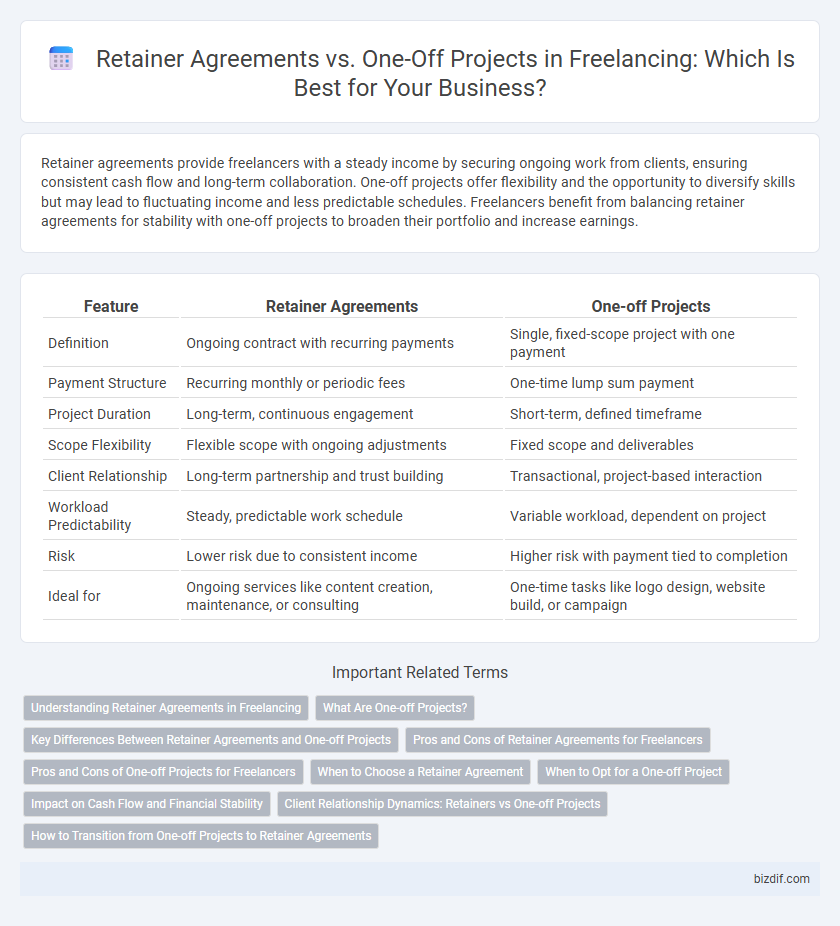Retainer agreements provide freelancers with a steady income by securing ongoing work from clients, ensuring consistent cash flow and long-term collaboration. One-off projects offer flexibility and the opportunity to diversify skills but may lead to fluctuating income and less predictable schedules. Freelancers benefit from balancing retainer agreements for stability with one-off projects to broaden their portfolio and increase earnings.
Table of Comparison
| Feature | Retainer Agreements | One-off Projects |
|---|---|---|
| Definition | Ongoing contract with recurring payments | Single, fixed-scope project with one payment |
| Payment Structure | Recurring monthly or periodic fees | One-time lump sum payment |
| Project Duration | Long-term, continuous engagement | Short-term, defined timeframe |
| Scope Flexibility | Flexible scope with ongoing adjustments | Fixed scope and deliverables |
| Client Relationship | Long-term partnership and trust building | Transactional, project-based interaction |
| Workload Predictability | Steady, predictable work schedule | Variable workload, dependent on project |
| Risk | Lower risk due to consistent income | Higher risk with payment tied to completion |
| Ideal for | Ongoing services like content creation, maintenance, or consulting | One-time tasks like logo design, website build, or campaign |
Understanding Retainer Agreements in Freelancing
Retainer agreements in freelancing establish a consistent, ongoing relationship where clients pay a fixed fee for prioritized access to services over a set period, ensuring steady income and workload predictability for freelancers. These agreements typically outline specific deliverables, hours, or availability, enhancing trust and long-term collaboration. Unlike one-off projects that are isolated, retainer contracts foster continuous engagement and smoother resource planning for both parties.
What Are One-off Projects?
One-off projects are freelance assignments completed within a specific timeframe and budget, focusing on delivering a single, well-defined outcome. These projects provide flexibility for freelancers to work with multiple clients without long-term commitments, emphasizing clear scopes and deadlines. Unlike retainer agreements, one-off projects require detailed proposals to outline deliverables, payment terms, and project milestones.
Key Differences Between Retainer Agreements and One-off Projects
Retainer agreements involve ongoing collaboration with predictable monthly fees and continuous availability, ensuring steady income and long-term client relationships. One-off projects are single, fixed-scope engagements with defined deliverables and deadlines, ideal for clients seeking specific outcomes without ongoing commitments. Key differences include payment structure, duration, scope flexibility, and the nature of client-freelancer interaction.
Pros and Cons of Retainer Agreements for Freelancers
Retainer agreements provide freelancers with consistent income and long-term client relationships, ensuring financial stability and streamlined project planning. However, they may limit flexibility as freelancers must allocate dedicated time regardless of workload fluctuations, potentially leading to underutilized hours. Balancing steady revenue against reduced project variety is essential for maximizing retainer benefits in freelance careers.
Pros and Cons of One-off Projects for Freelancers
One-off projects offer freelancers quick payment and flexibility, allowing them to diversify clients and avoid long-term commitments. However, inconsistent workload and unpredictable income can pose challenges, making financial stability harder to maintain. Managing multiple one-off projects requires strong time management skills to balance deadlines and client expectations effectively.
When to Choose a Retainer Agreement
Choose a retainer agreement when consistent, ongoing work is needed, ensuring steady income and stronger client relationships in freelancing. Retainers are ideal for projects requiring regular maintenance, updates, or continuous collaboration, providing predictability in workload and cash flow. Freelancers benefit from improved resource planning and long-term commitment, making retainers preferable over one-off projects for sustainable career growth.
When to Opt for a One-off Project
One-off projects are ideal when clients require a specific deliverable with a clear deadline, making scope and budget easier to define. Freelancers benefit from one-off projects by focusing on singular tasks without long-term commitments, allowing flexibility and varied workload. This arrangement suits businesses testing new ideas or needing occasional expertise without ongoing expenses associated with retainer agreements.
Impact on Cash Flow and Financial Stability
Retainer agreements provide consistent monthly income, enhancing cash flow predictability and financial stability by securing long-term client commitments. One-off projects, while potentially lucrative, create variable income streams that can lead to cash flow fluctuations and financial uncertainty. Prioritizing retainers allows freelancers to better manage expenses and plan growth strategies with steady revenue.
Client Relationship Dynamics: Retainers vs One-off Projects
Retainer agreements foster long-term client relationships by providing consistent value and ongoing collaboration, leading to deeper understanding of client needs and proactive problem-solving. One-off projects focus on specific deliverables with defined timelines, often resulting in transactional interactions and limited client engagement beyond project completion. The continuous communication and trust built through retainers enhance client satisfaction and retention compared to the episodic nature of one-off projects.
How to Transition from One-off Projects to Retainer Agreements
Transitioning from one-off projects to retainer agreements involves building consistent value and trust with clients by demonstrating ongoing expertise and reliable results. Freelancers should propose clear, scalable service packages that address clients' long-term needs while emphasizing cost-effectiveness and priority access. Maintaining regular communication and delivering consistent quality fosters client confidence, making the shift to retainer models smoother and more sustainable.
Retainer agreements vs One-off projects Infographic

 bizdif.com
bizdif.com